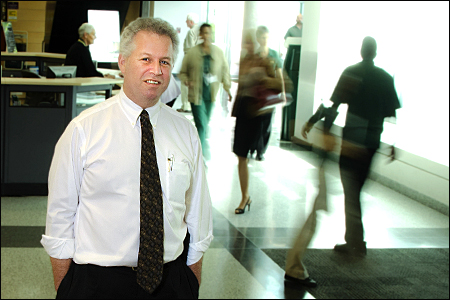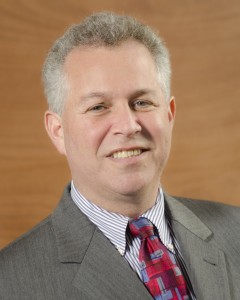The USF Physicians Group is the only academic medical center on the west coast of Florida.
So when the opportunity to lead USF’s practice plan came up, Jeff Lowenkron, MD, jumped at it. After working for the Mid-Atlantic Permanente Medical Group of 1,000 physicians, he considered it a wonderful challenge to help the USF group of more than 400 physicians to function more like an integrated multi-specialty group.

What intrigued him more was the chance to help drive the continued growth by demonstrating the value of the academic medical center to health and well-being of the Tampa community.
“Growing into the largest medical practice plan is all fine and good, but size isn’t necessarily a competitive advantage,” said Dr. Lowenkron, a practicing internist who joined USF in January as CEO of the USF Physicians Group.
“Our competitive advantage is that we are an academic medical center. We have to be successful on each of the three axes: education, research and clinical.
“Dr. Lowenkron’s work at Kaiser Permanente is exactly the level of experience our physician’s group requires to not only weather the current economy, but to propel us into the healthcare environment to come,” said Dr. Stephen Klasko, CEO of USF Health and dean of the USF College of Medicine.
DEFINING ADVANTAGES
What separates the USF Physicians Group from other multi-specialty practices in the Tampa Bay area is that it is part of an academic medical center, a connection that benefits both patients and the community it serves.
National studies show that patients tend to fare better at academic medical centers, which typically treat some of the sickest patients and toughest medical cases. In addition, patients have access to the newest treatments that are provided by clinics and hospitals linked to a college of medicine. And, the communities served by an academic medical center feel a huge economic impact due to a center’s hiring, buying and building power.
The USF Physicians Group serves patients from throughout Florida – even some from outside Florida – but most come to USF from the 15-county region surrounding Tampa. Its position, both geographically and professionally, stood out to Dr. Lowenkron in a big way.
“It’s an exciting time with incredible challenges and fabulous opportunities,” he said. “We are linked to the community in a way where our commitment to success mirrors the needs of Tampa for us to be successful.”
PLANS FOR THE USF PHYSICIANS GROUP
Dr. Lowenkron said that when he visited USF last fall, he noted one apparent characteristic in everyone he met: an incredible sense of optimism.
“Most institutions are trying to figure out how to batten down the hatches and weather the storm,” he said. “But at USF, they are looking ahead and designing their own future. I definitely want to help design the future of health care.”
Dr. Lowenkron said that, although there is a multi-specialty group in place, there is room to improve our system, to one that better coordinates care across departments and is more patient centric.
“There are systems in place, but there are also systems missing, and others that require modification,” he said. “Departments are trying to grow services, focusing on revenue generation, but not understanding the true cost of providing those services.
“There has to be some re-tooling that works toward a more cohesive whole. Form must follow function. We will assure alignment with the mission of USF Health and of the university. There are decisions to be made that cut across the entire group, including building new systems, fine-tuning service delivery, assessing service lines, continual development and evaluation of new business, and measuring quality outcomes.”
Dr. Lowenkron said he sees a strong patient-experience at USF, but wants it to improve “to make the care experience delightful for both patients and families as well as for those who deliver the care.”
“People go into healthcare because they want to help,” he said. “So let’s let them help. Healthcare doesn’t happen in an administrative office.”
KAISER PERMANENTE
Over his 17 years with the Permanente Medical Group, Dr. Lowenkron held increasingly greater leadership roles, including spearheading Mid-Atlantic’s process improvement efforts for patient access, scheduling, patient flow, service excellence, and communication and messaging. Prior to that he was the area medical director for the District of Columbia and the suburban Maryland regions, where he was responsible for a medical group (similar in size to the USF Physicians Group) in two hospitals, 12 medical centers and a skilled nursing facility. Kaiser Permanente of the Mid-Atlantic States provides health care to about 500,000 people throughout 30 medical centers in Washington, DC, Maryland, and Virginia. Kaiser Permanente is one of the nation’s largest not-for-profit health plans serving nearly 9 million members.

Dr. Lowenkron earned a bachelor’s degree from Johns Hopkins University in Baltimore, MD, and a medical degree from Creighton University School of Medicine in Omaha, NE. He completed his residency and chief residency in internal medicine at Georgetown University Hospital in Washington, DC, where he also earned a master’s degree in public policy. Dr. Lowenkron was also trained in the executive leadership program at Harvard University School of Business in Cambridge, MA.
PERPETUAL PROGRESSION
Dr. Jeff Lowenkron has a tremendous desire to have broad-based impact improving the health and well-being of the community in which he works. He believes that care delivery is a team sport and will require incredible effort across the program for us to succeed.
“When you stop feeling challenged, it’s time for a change,” Dr. Lowenkron said.
Story by Sarah A. Worth, Photos by Eric Younghans, USF Health Office of Communications
